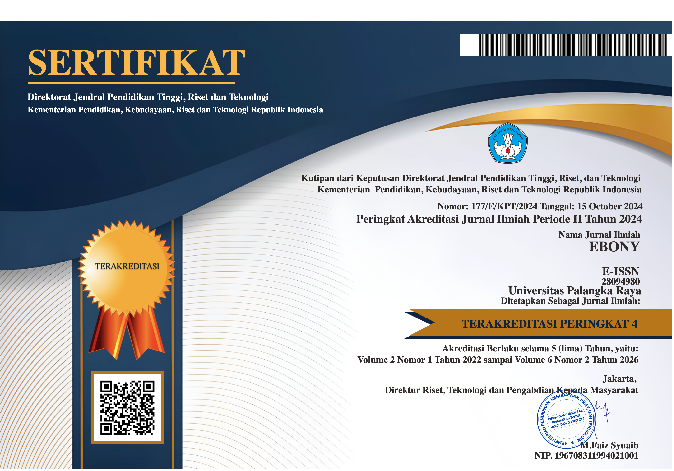Improving Student Interests and learning outcomes for English Subject by using Mind Mapping through Online Zoom Application
DOI:
https://doi.org/10.37304/ebony.v3i1.7580Keywords:
English, mind mapping, interest, learning outcomes, Zoom meetingAbstract
This study aims to Improve Interest and Learning Outcomes in English Using the Mind Mapping Method assisted by the Zoom Meeting Application in Class X IPS 2 SMA Negeri 3 Pangkalan Bun. This is a class action research (PTK) study to create better English learning. This PTK uses the Arikunto stage. Each cycle consists of four stages, namely: (1) the action planning stage, (2) the action implementation stage, (3) the observation and inner achievement stage, and (4) the analysis and reflection stage. The research subject consisted of 32 students. Research Instruments use student learning outcomes. Data Analysis uses percentage techniques. The results showed that students’ English learning outcomes increased, namely from the first cycle of 32 students of Class X IPS 2 SMAN 3 Pangkalan Bun, there were 23 students, or 72%, who had achieved a KKM score of 73 with an average class score of 75.15. In cycle II, of the 32 students of Class X IPS 2 SMAN 3 Pangkalan Bun, 30 students, or 94%, had achieved a KKM score of 73 with an average score of 81.87. Based on the actions taken, it can be concluded that the Mind Mapping Method assisted by the Zoom Meeting Application can improve the quality of the English learning process.
Downloads
References
Arikunto, S., Suhardjono, & Supardi. (2008). Penelitian Tindakan Kelas. Jakarta: Bumi Aksara.
Aviani, R. A. (2014). Implementasi Model Pembelajaran Kooperatif Mind Mapping terhadap Hasil Belajar Biologi Siswa Kelas VIII SMP Negeri 2 Boyolali Tahun Pelajaran 2013/2014. Undergraduate Thesis. Universitas Muhammadiyah Surakarta. http://eprints.ums.ac.id/id/eprint/30029
Brahma, I. A. (2020). Penggunaan Zoom Sebagai Pembelajaran Berbasis Online Dalam Mata Kuliah Sosiologi dan Antropologi pada mahasiswa PPKN Di STKIP Kusumanegara Jakarta. Jurnal Ilmu Pendidikan Nonformal AKSARA, 6(2), 97-102. http://dx.doi.org/10.37905/aksara.6.2.97-102.2020
Buzan, T. (2007). Buku Pintar Mind Map. Jakarta : Gramedia Pustaka Utama. Retrieved from https://www.academia.edu/25766471/Buku_Pintar_Mind_Map_Tony_Buzan
Dwyer, C. P., Hogan, M. J., & Ian, S. (2015). The effects of argument mapping-infused critical thinking instruction on reflective judgment performance. Thinking Skills and Creativity, 16, 11-26 https://doi.org/10.1016/j.tsc.2014.12.002
Fauzi, I., Saman, T. N., Zannah, N., Octaviani, S., & Winey, B. G. (2022). The Relationship between Students’ Reading Motivation and the Success to Comprehend the English Texts. Journal of English Teaching and Learning Issues, 5(1), 31-38. http://dx.doi.org/10.21043/jetli.v5i1.14959
Firman, & Rahman, S. R. (2020). Pembelajaran Online Ditengah Pandemic Covid-19. Indonesian Journal of Educational Science, 2(2), 81-89. https://doi.org/10.31605/ijes.v2i2.659
Hambali, D.R. (2020). Mind Mapping Strategy in Writing Descriptive Text Implemented to Ninth Grade Students. EBONY: Journal of English Language Teaching, Linguistics, and Literature, 1(1), 1–9. https://doi.org/10.37304/ebony.v1i1.3096
Haqien, D. & Rahman, A. A. (2020). Pemanfaatan Zoom Meeting Untuk Proses Pembelajaran Pada Masa Pandemi Covid-19. Jurnal SAP (Susunan Artikel Pendidikan), 5(1). 51-56. http://dx.doi.org/10.30998/sap.v5i1.6511
Riyadi, S. (2019). Peningkatan Minat Dan Hasil Belajar Bahasa Inggris Materi Teks Explanation Melalui Penerapan Metode Mind Mapping Pada Siswa Kelas Xi-Ipa-1sma Negeri 1 Trenggalek Semester 2 Tahun Pelajaran 2019/2020. Jurnal Ilmiah Pendidikan Visioner, 3(2), 78-84. https://ejurnalkotamadiun.org/index.php/JIPV/article/view/1324/1194
Downloads
Published
How to Cite
Issue
Section
License
Copyright (c) 2023 Ika Sari Puspita

This work is licensed under a Creative Commons Attribution 4.0 International License.











